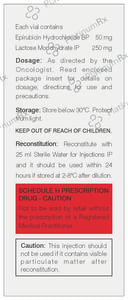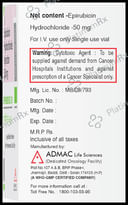Epirubicin
Uses
Epirubicin is used in the treatment of cancer.
How it Works
How Epirubicin works Epirubicin is an anti-cancer medication that functions by inhibiting the activity of the enzyme topoisomerase II, which is involved in the DNA replication of breast cancer cells. Additionally, it generates harmful chemicals known as free radicals, which lead to DNA damage. This process slows the growth of breast cancer cells and ultimately results in their destruction.
Side Effects
Common side effects of Epirubicin include nausea, low blood platelets, hair loss, absence of menstrual periods, fever, anemia (low number of red blood cells), diarrhea, decreased white blood cell count (neutrophils), weight loss, hot flashes, gastrointestinal inflammation, and rash.
Expert Advice
- Epirubicin is used alone or in combination with other medications for the treatment of various types of cancer.
- It is administered through a drip into a vein (intravenous infusion) by a healthcare professional.
- This medication may cause fatigue or drowsiness.
- Do not drive or engage in activities that require mental alertness until you understand how it affects you.
- Use a reliable contraceptive method to prevent pregnancy while taking this medication and for 6 months after discontinuation of treatment.
- Your doctor may perform regular blood tests to monitor your blood cells, liver, and heart function during treatment with this medication.
- Inform your doctor immediately if you notice any signs of infection, such as fever, sore throat, or rash.
Related Medications
Epirubicin 10mg

₹480

₹730.3
MRP ₹890.6
Epirubicin 10mg

₹522

₹730.3
MRP ₹890.6
Epirubicin 10mg

₹255.4

₹730.3
MRP ₹890.6
Epirubicin 10mg

₹403

₹730.3
MRP ₹890.6
Epirubicin 10mg

₹762.3

₹730.3
MRP ₹890.6
Epirubicin 10mg

₹454.1

₹730.3
MRP ₹890.6
Epirubicin 10mg

₹805.2

₹730.3
MRP ₹890.6
Epirubicin 10mg

₹730.3
MRP ₹890.6
Epirubicin 50mg

₹1,209
Epirubicin 50mg

₹3,144
Epirubicin 50mg

₹637.6
Epirubicin 50mg

₹1,530
Epirubicin 100mg

₹2,335
Epirubicin 50mg

₹2,015
Epirubicin 100mg

₹3,059
Epirubicin 100mg

₹3,315.3
Epirubicin 100mg

₹4,700
Epirubicin 50mg

₹2,490
Epirubicin 100mg

₹4,500
Epirubicin 50mg

₹2,015
Epirubicin 50mg

₹1,788
Epirubicin 50mg

₹60.9
Epirubicin 50mg

₹1,530
Epirubicin 50mg

₹1,956
Epirubicin 50mg

₹18,353
Flat ₹100 off on first app order | Use Code: APP100 |
Flat ₹100 off on first app order
USE CODE: APP100

Download Now